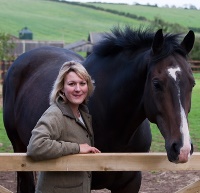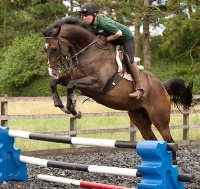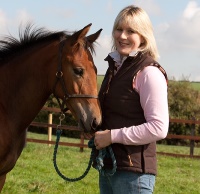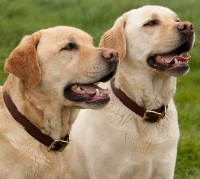On Monday (February 15) Alice Barnard will take up her new role as chief executive officer of the Edge Foundation, replacing acting chief executive David Harbourne who will return to his policy and research role.
For the former chief executive of The Peter Jones Foundation, the position will be the latest step in a diverse career that has taken her from writing for the Police newspaper at Scotland Yard, to running for a seat in Parliament and setting up her own business.
Barnard has always been driven and quick to adapt to new situations. She puts this partly down to her experiences as a child, when her family moved a number of times because of her father’s work in the army.
Born in Queen Charlotte’s Hospital in London in 1977, Barnard and her parents moved to live in Germany for three years until she was four and a half, when they returned to the UK. Her sister Charlotte was born in Germany and Barnard attended kindergarten there.
She has fond memories of living in army quarters in Weingarten, where there were a number of other children her age. “We were properly part of the army family,” she says.
“It was like a ready built community … It’s really safe and because all the quarters are purpose built, it is like a village – safe, open, fun. I enjoyed it. ”

When the family moved back to England and settled in Salisbury in Wiltshire, Barnard started her first school, Leaden Hall, which she attended for a year. She remembers Salisbury as “charming”, with narrow, cobbled streets and a beautiful cathedral.
But it wasn’t long before they were on the move again, uprooting to Sheffield as her father went back to his former career as a barrister.
She says adapting to the change wasn’t a struggle at the time. “It was quite transient, which didn’t worry me, it seemed quite normal to move. I was blissfully unaware of having to pack everything up again!”
They moved into the centre of Sheffield, a busy and crowded city compared to her previous home.
But Barnard liked Sheffield, and says it sometimes gets a bad press. “Most people think of Sheffield as being heavily industrial — which obviously it is in how in made its wealth — but it’s actually full of Victorian buildings and big, wide roads with lots of trees on them. It wasn’t a difficult transition,” she says.
She went to a private school, Sheffield High School for Girls, which she says was “heavily motivated by results”. It was here that she discovered a passion for history and settled on politics as her chosen career of the future.
“I had a lovely history teacher called Mrs Hangas who was a bit eccentric; I don’t think she would mind me saying that,” Barnard says.
“I loved her and she completely inspired me and made me believe that anything was possible.
“I’d wanted to be a politician, although I’m sure it’s not a popular choice at that age.”
She enjoyed talking about the current affairs of the 1980s and 90s with her school friends.
“We probably just talked rubbish at the time, but it seemed very real. We had lots of opinions on things – whether they were informed or not I’m not sure!”

After finishing school Barnard took a year out and worked for gentleman’s outfitters Brocklehursts. She worked in the warehouse of the retail outlet and as a sales assistant at shows around the country, looking after others in the team while they were travelling – despite being the youngest by far.
“I really wanted to work properly. I had had bar jobs and things like that, but I wanted to find out what work really was,” she says.
“It was good for me because it made me independent. Half the time I was completely out of my comfort zone … I realised the importance of team work.”
When her gap year was up, Barnard decided she wanted to go to Cambridge to read history.
She says the prospect of applying was scary after being in the world of work and she set herself a project on ‘Gladstone and the Irish Question’, to help get back into an academic mindset and show the tutors how much she wanted to be there.
“It was nerve-wracking. You know that the competition is going to be really difficult and the other participants are going to really want it,” she says.
But she successfully secured a place at Newnham College, and despite initial worries about keeping up with her peers, she “settled in well”.
The three years flew by for Barnard – thanks in no small part to fitting her passion for horses around all her academic work.
“Everything revolved around horses while I was at Cambridge. I took my horse with me and I would get up at the crack of dawn to muck him out before I went to the library,” she says.
Barnard used the money saved from her gap year to put her horse, Dennis, into stables just outside Cambridge and it was looking after him that also led her to meet her now husband, Matt, when she was 19.

A jockey and trainer working with racehorses, she met Matt at a competition.
“I thought he was a bit bossy at first actually,” she says. “He was pretty good at what he did so that’s probably why – he knew what he was doing.”
Despite these distractions, Barnard knuckled down in her third year and passed her final exams. She then went on to work for Mike Gallimore, editor of Sporting life, a racing newspaper.
She was sent straight out to get interviews and for her first one bagged a chat with TV presenter and broadcaster, Clare Balding.
“I remember staring at the phone or about ten minutes before I could summon up the courage to call her,” Barnard says.
Working for Gallimore was another important life experience. “Although he completely dropped me in at the deep end he was a really nice guy,” she says. “In a very short period of time I learned a huge amount from him.”
Gallimore also ran offices in London, and it wasn’t long before Barnard transferred to the capital to work at New Scotland Yard on the police newspaper The Job.
She enjoyed being part of another new environment, where security clearances were required just to get into work in the morning.
“The newspaper was produced every two weeks and I used to have to take it down to the Met Commissioner [Paul Condon] and that was quite a nerve-wracking thing to do. He would ask about all the articles,” she recalls.
The job was also a new challenge in terms of location – Barnard was living in Cambridgeshire at the weekends with Matt, but during the week she stayed with friends of her parents, as the cost of commuting everyday was just too expensive.
Then in 2000 Barnard decided to take a change in direction, starting a five year career in advertising. She worked in sales for a company called SPG and says the sector was “a very competitive, male-dominated environment”.
She didn’t find it intimidating though, and says her success helped her to stay confident. “I didn’t find it difficult, mainly because I was good at it. If I’d struggled with the work, I think I would have found it much more tough.”
She then moved to work for a competitor, The World Trade Group, with a number of her other colleagues who had been “poached”, and eventually they decided to set up their own company – Building on Business.
Still only in her late 20s, Barnard and her colleagues established themselves in a friend’s basement in Dulwich.
“None of us had had any experience of setting up a business before … it was a steep learning curve,” she says.
It taught her the pressures of managing a team. “When we started taking on staff you suddenly saw that weight of responsibility, it’s not just about you and getting through the say and earning your living – it’s suddenly about making a success of something because other people are depending on it as well,” she says.
She was a shareholder of the company and enjoyed the work, but after 18 months began to feel that “there was something missing”.
“Although the cut and thrust of it was quite exciting, I felt there was probably something else out there in life,” she explains.
I am looking forward to the opportunity to be able to work with FE in a broader sense. At Edge I feel I will be able to see the whole landscape, right the way through the whole of the FE sector and how it operates.
This led her to move into a campaigning environment, recalling her childhood dreams of politics. In 2007, a year after getting married, Barnard decided to go for a position that came up at the Countryside Alliance, as a regional director for the east of England.
“The Countryside Alliance I guess is best known for being pro-hunting, shooting and fishing, so it’s quite a contentious organisation in the sense that public opinion is often not with them. But obviously I’d been involved with horses and hunting all my life,” she says.
Her role focused on media, PR, fundraising, campaigning and lobbying for the east of England and included issues such as setting up rural broadband and campaigning against the closures of rural post offices and building on flood plains. She lobbied local MPs and local authorities and found her previous experience of journalism gave a helpful context.
“It was about everything rural and working on behalf of rural communities,” she says.
Barnard worked for the Countryside Alliance for five years, becoming chief executive when she was just 34, in 2010.
“I was dazed when I got it. The Countryside Alliance has this image of being 60-something, male, white, middle-class, and they’d never had CEO in their 30s before – let alone a woman.”
In the same year she had gone onto the Conservative Party list and stood as candidate. She got shortlisted for Stratford-on-Avon, but was beaten by Nadhim Zahawi, who is now the Prime Minister’s Apprenticeships Adviser.
“It was an amazing and brutal process and I learned a huge amount. It was that process that inspired me to go for the top job at the Countryside Alliance. Everything I was doing I hadn’t done before, it pushed me to the edge of my capabilities and I enjoyed that in some strange way.”

Then in 2012, a new opportunity presented itself for Barnard. She was approached by a head hunter who invited her to apply for the role of CEO at the Peter Jones Foundation.
The Foundation was founded in 2005 by the Dragons’ Den entrepreneur and focuses on supporting educational activities and initiatives which champion entrepreneurship.
“I was instantly attracted to the position,” she says. “I was quite excited about the opportunity to move out of rural campaigning, because I didn’t want that to be my only area of expertise. I wanted to have a broad CV and I wanted to be relevant to more people.”
Barnard says she loved the work from the very beginning and thoroughly enjoyed learning about what made the industry tick.
“I really enjoyed the opportunities to talk to so many people – principals, policy makers and the students themselves,” she says.
She has recently been keeping up with changes in education because her daughter, Isobel, is coming up to taking her GCSEs, and will be one of the first cohort to take the new exams with the 1-9 grading system.
Barnard says it is important to acknowledge that women can have vibrant careers alongside family life, even though it may be challenging at time. “I think women have a tough time trying to juggle everything and getting a balance is never easy,” she adds.
Turning to her new role, Barnard says: “I hope my new appointment at the Edge Foundation proves that I really am very passionate about this area. I think this sector is hugely important and it is one that I really see myself working in, working for, for the long haul.”
She had done partnership work with the Edge Foundation whilst heading up the Peter Jones Foundation, and is now “absolutely delighted” to be joining them.
In terms of plans for starting her new position, she says: “We will be working on the ebacc … we think that young people should have the opportunity to study technical and professional qualifications alongside.
“I am looking forward to the opportunity to be able to work with FE in a broader sense. At Edge I feel I will be able to see the whole landscape, right the way through the whole of the FE sector and how it operates.”
Barnard recognises that “FE had taken quite a hit over the last few years financially”.
“It’s about rebuilding and finding a way forward, so that the industry does not lose its confidence,” she says.
It’s a personal thing
What’s your favourite book?
Late Fragments by Kate Gross. It’s an amazing book, she was an amazing women. She very sadly died of cancer, but if someone is looking for someone inspirational, she was incredible.
What do you do to switch off from work?
Spending time with my horses, my dogs and my family.
What’s your pet hate?
Lateness. I hate being late myself, even if it is out of my control, but I’m not keen on other people being late either!
If you could invite anyone to a dinner party, living or dead, who would it be?
I’ve decided on a man and a woman for good gender balance – so it would be Sylvia Plath and Albert Einstein, I think that would be interesting.
What did you want to be when you were growing up?
A politician.
Curriculum Vitae
1977: Born in Queen Charlotte’s Hospital in London
1978: Moved to Rheindahlen Germany and attended kindergarten
1981: Returned to the UK and moved to Salisbury, attended Leaden Hall independent day and boarding school for girls
1982: Moved to Sheffield and attended Sheffield High School for Girls until age 18
1995: Finished school and took a year out working for Brocklehursts gentleman’s outfitters, also working with horses in spare time
1996: Went to Cambridge to study history
1996: Met her husband Matt while working with horses in spare time
1999: Started work as a journalist for former editor of the Sporting Life, then at New Scotland Yard working on the Police newspaper, The Job
2000: Started work in advertising with SPG and later The World Trade Group
2001: Daughter Isobel was born
2005: Set up her own company with colleagues – Building on Business
2006: Got married
2007: Appointed regional director for the east of England at the Countryside Alliance
2010: Shortlisted for two safe Conservative seats, appointed chief executive officer of the Countryside Alliance
2012: Became chief executive of the Peter Jones Foundation
2016: Became chief executive of the Edge Foundation








Your thoughts